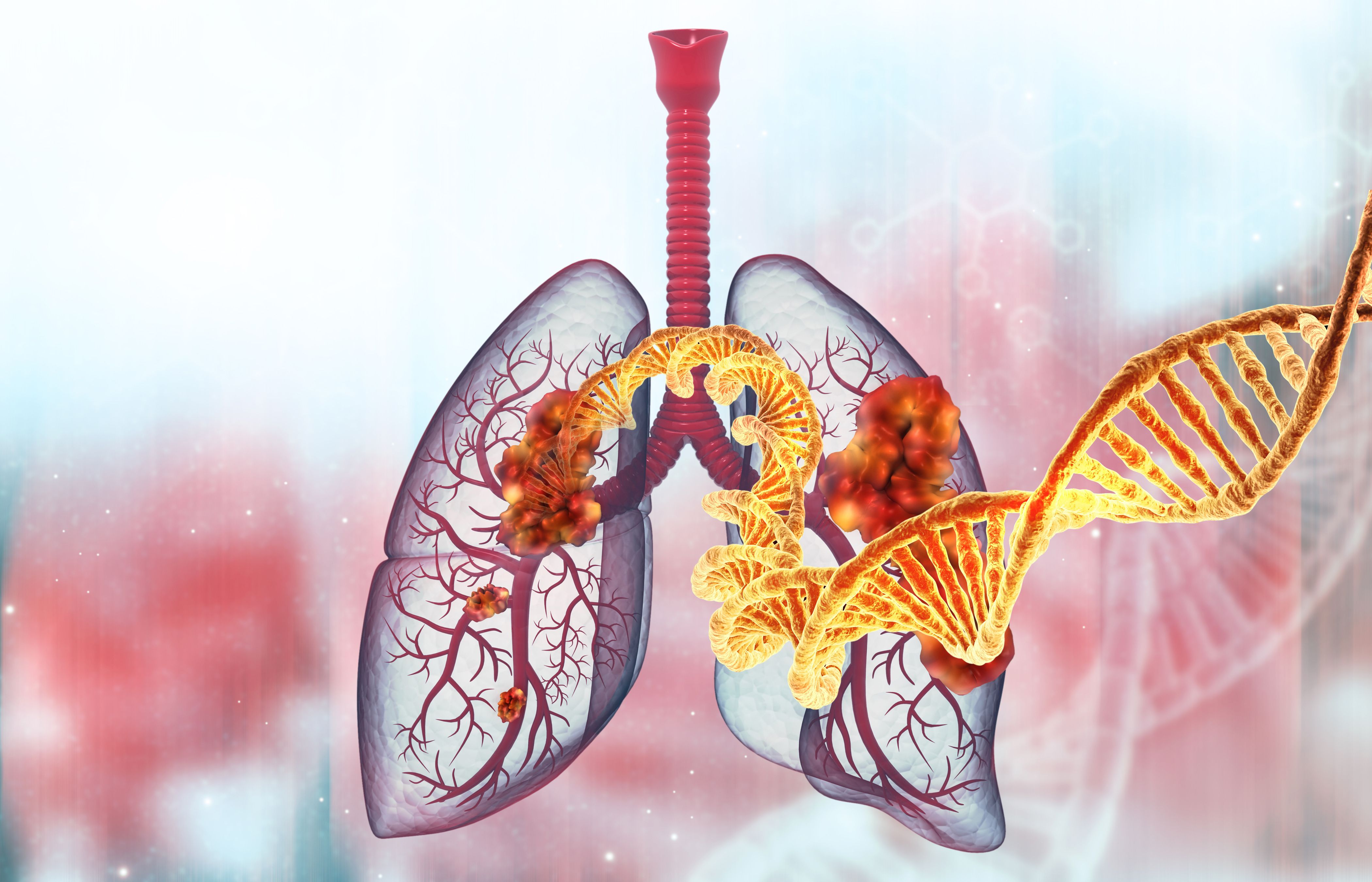Amivantamab Plus Chemo Extends PFS in Advanced EGFR-Mutated NSCLC
The phase 3 MARIPOSA-2 study has met its primary end point.
Lung malignancy | Image Credit: © Rasi - www.stock.adobe.com

Treatment with amivantamab-vmjw (Rybrevant) plus chemotherapy administered with or without lazertinib (Leclaza) demonstrated a statistically significant and clinically meaningful improvement in progression-free survival (PFS) when compared with chemotherapy alone in patients with locally advanced or metastatic EGFR exon 19 deletions (ex19del) or L858R substitution non–small cell lung cancer (NSCLC).1
This finding, showing that the phase 3 MARIPOSA-2 clinical trial (NCT04988295) has met its primary end point, comes from the topline analysis of the study. The analysis also showed no new safety signals for amivantamab when added to chemotherapy. Full results from this study will be presented at a future medical meeting.
"MARIPOSA-2 provides the first phase 3 study data of Rybrevant-based regimens in the broader EGFR-mutated non–small cell lung cancer population," said Peter Lebowitz, MD, PhD, global therapeutic area head, Oncology, Janssen Research & Development, LLC, in a press release. "The study builds on the significant innovation of Rybrevant, a first-in-class bispecific antibody targeting two major oncogenic driver pathways, with clinically meaningful results that may change the treatment paradigm."
In the randomized, open-label, phase 3 MARIPOSA-2 study, investigators are assessing the efficacy and safety of amivantamab plus the chemotherapy combination of carboplatin and pemetrexed with or without lazeritinib. To carry out this investigation, patients are divided into 5 treatment arms. In arm A, patients received oral lazeritinib in combination with amivantamab and combination chemotherapy. In arm B, patients are treated chemotherapy alone. Arm C is administered amivantamab plus the chemotherapy combination. The 2 extension cohorts are arm A2 and arm C2, which respectively receive lazeritinib plus amivantamab and chemotherapy or amivantamab plus chemotherapy.2
In addition to PFS, the study is evaluating the secondary efficacy end points of objective response rate, overall survival, duration of response, time to subsequent therapy, PFS after subsequent therapy, time to symptomatic progress, and intracranial PFS. The secondary safety end points being explored in the study include the number of patients with anti-amivantamab anti-bodies, adverse events, clinical laboratory abnormalities, serum concentration of amivantamab, plasma concentration of lazeritinib, and multiple quality of life measures.
Patients eligible to enroll in the ongoing study are those with at least 1 measurable lesion per RECIST v1.1, histologically or cytologically confirmed disease, and an ECOG performance status of 0 or 1. Patients with a history of brain metastases are permitted to enroll given these were treated. Toxicities from prior anti-cancer therapy must have been resolved to a grade 1 or grade 2 at baseline. The study also permits patient who were previously treated with simertinib (Tagrisso), given their treatment occurred in the first-line setting.
Patients are excluded from the study if they received prior radiotherapy for palliative NSCLC treatment. The study also excludes those with symptomatic or progressive brain metastases, history of or active leptomeningeal disease, known small cell transformation, history of interstitial lung disease, or history or clinically significant cardiovascular disease.
REFERENCES:
1. Phase 3 MARIPOSA-2 study meets dual primary endpoint resulting in statistically significant and clinically meaningful improvement in progression-free survival for Rybrevant® (amivantamab-vmjw) plus chemotherapy with and without lazertinib versus chemotherapy alone in patients with EGFR-mutated non-small cell lung cancer after disease progression on osimertinib. News release. September 6, 2023. Accessed September 6, 2023. https://tinyurl.com/9cuxatnf
2. A study of amivantamab and lazertinib in combination with platinum-based chemotherapy compared with platinum-based chemotherapy in patients with epidermal growth factor receptor (EGFR)-mutated locally advanced or metastatic non- small cell lung cancer after osimertinib failure (MARIPOSA-2). ClinicalTrials.gov. Updated May 31, 2023. Accessed September 6, 2023. https://classic.clinicaltrials.gov/ct2/show/NCT04988295
Kim Evaluates New Regimens for EGFR+ Lung Cancer
January 20th 2025During a Community Case Forum event in partnership with the Medical Oncology Association of Southern California, Edward S. Kim, MD, MBA, discussed the FLAURA2 and MARIPOSA trials of newer regimens for EGFR-positive lung cancer.
Read More